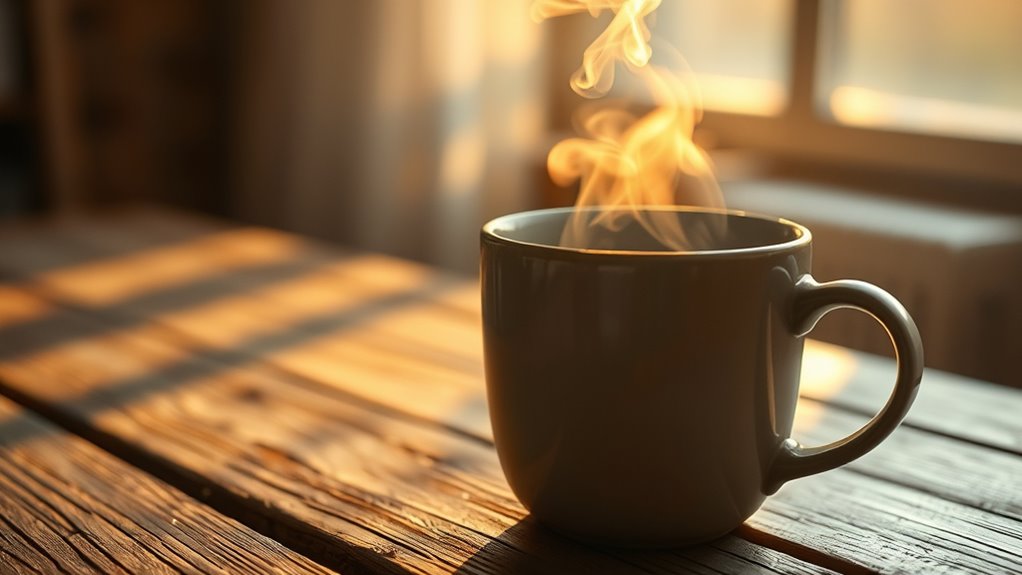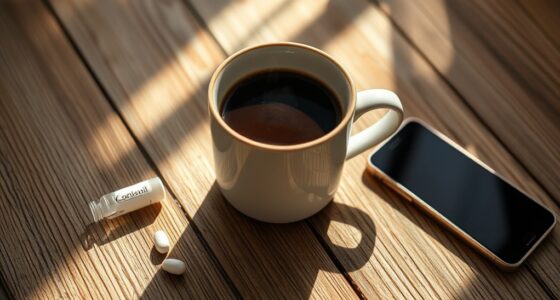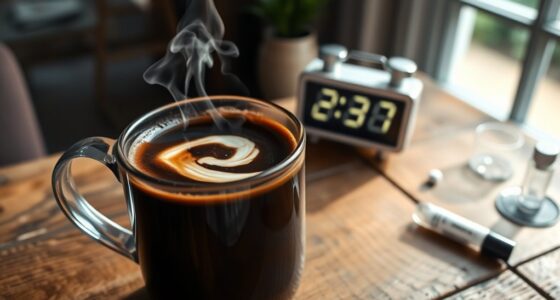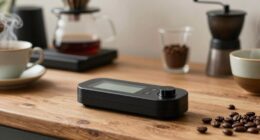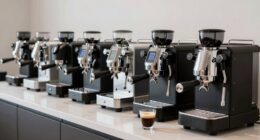The best time to drink coffee is mid-morning, around 9:30 to 11 a.m., when your natural cortisol levels dip. Drinking during this window maximizes caffeine’s alertness boost because you’re not competing with your body’s peak cortisol moment right after waking. If you time it right, you’ll feel more energetic without interfering with your sleep later. Keep exploring for tips on how to optimize your caffeine routine for better focus and rest.
Key Takeaways
- Drink coffee mid-morning (9:30-11 a.m.) when cortisol levels naturally decline for maximum alertness.
- Avoid consuming coffee immediately after waking to prevent reduced caffeine effectiveness due to cortisol peaks.
- Time caffeine intake at least 6 hours before bedtime to prevent sleep disruption.
- Consuming coffee 30-60 minutes before exercise can enhance physical performance.
- Personal factors like genetics and stress influence the best timing and amount of caffeine intake.

Knowing the best time to drink coffee can help you stay alert and maximize its benefits. Your body’s natural circadian rhythms influence when caffeine most effectively boosts your alertness.
In the morning, your cortisol levels—the hormone responsible for wakefulness—are naturally high, especially immediately after waking. Drinking coffee during this time may be less effective because caffeine’s stimulating effects can be blunted when cortisol peaks.
Instead, the ideal coffee timing aligns with a mid-morning window, around 9:30 to 11 a.m., when cortisol levels typically dip. This dip creates a natural opportunity for caffeine to enhance alertness without competing against your body’s internal wakefulness signals.
By waiting until mid-morning, you allow your body’s natural cortisol rhythm to decline, making caffeine more effective at boosting your performance and focus. During this period, caffeine reaches its peak caffeine levels in your bloodstream, providing a more noticeable lift in alertness.
This strategy not only helps you feel more awake but also supports better cognitive function and productivity during the day. If you drink coffee too early, right after waking, you might find that its energizing effect is less pronounced, as your body is already in a heightened state of alertness from cortisol.
Conversely, drinking coffee too late can interfere with your sleep, especially if you’re sensitive to caffeine or have irregular sleep patterns.
In addition to timing, individual factors like genetics, stress levels, and sleep quality influence how your body responds to caffeine. Some people metabolize caffeine quickly, experiencing its effects sooner and wearing off faster, while others process it more slowly.
If sleep disruption is a concern, experts generally recommend avoiding coffee at least 6 to 8 hours before bedtime, ensuring your sleep isn’t compromised. Consuming caffeine earlier in the day also prevents any negative impact on your sleep quality, helping you maintain a healthy sleep-wake cycle.
Furthermore, strategic coffee timing can enhance your physical performance. Drinking coffee about 30 to 60 minutes before exercise can help you perform better, as caffeine peaks during this window.
Additionally, understanding dog breed characteristics can help tailor your coffee breaks to fit your lifestyle and energy needs better.
Frequently Asked Questions
What Is the Perfect Time to Drink Coffee?
You wonder when the best time to drink coffee is. To get the most energy, aim for mid- to late-morning, around 9:30 to 11 a.m., when your cortisol levels dip naturally.
Avoid drinking right after waking, since your body’s cortisol peaks then.
Also, don’t sip coffee too late, or it might interfere with your sleep.
Adjust timing based on your personal sensitivity for the best boost.
Why Wait 90 Minutes to Drink Coffee?
You should wait about 90 minutes before drinking coffee because your body’s natural cortisol levels peak within 30-45 minutes after waking, which already keeps you alert.
By delaying, you allow cortisol to decline, making caffeine more effective at boosting your energy and focus.
Drinking during this dip maximizes caffeine’s benefits, prevents interference with your hormone balance, and helps you stay energized throughout the day.
Why Is 10 Am the Perfect Time to Have Your Morning Coffee?
You wonder why 10 a.m. is the best time for coffee. It’s because, around then, your cortisol levels naturally dip, making your caffeine more effective.
Drinking coffee now boosts your focus and energy without disrupting your body’s hormonal balance. Plus, it helps you avoid the stress and inflammation caused by caffeine hitting your system when cortisol is already high.
This timing supports your health and keeps you alert all morning.
What Is the 2 Hour Coffee Rule?
The 2 hour coffee rule advises you to avoid drinking coffee within two hours of bedtime. This is because caffeine stays in your system for hours, potentially disrupting your sleep.
By following this rule, you give your body enough time to process caffeine, helping you fall asleep more easily and enjoy better quality rest.
It’s a simple way to protect your sleep health and feel more refreshed each day.
Conclusion
To make the most of your coffee, drink it when your cortisol levels are naturally lower—typically mid-morning or early afternoon. Avoid drinking coffee first thing in the morning, as it can interfere with your body’s natural alertness cycle. By timing your coffee intake wisely, you’ll boost your energy without disrupting your sleep or increasing tolerance. So, pay attention to your body’s rhythm and enjoy coffee at the ideal moments for maximum benefit.
